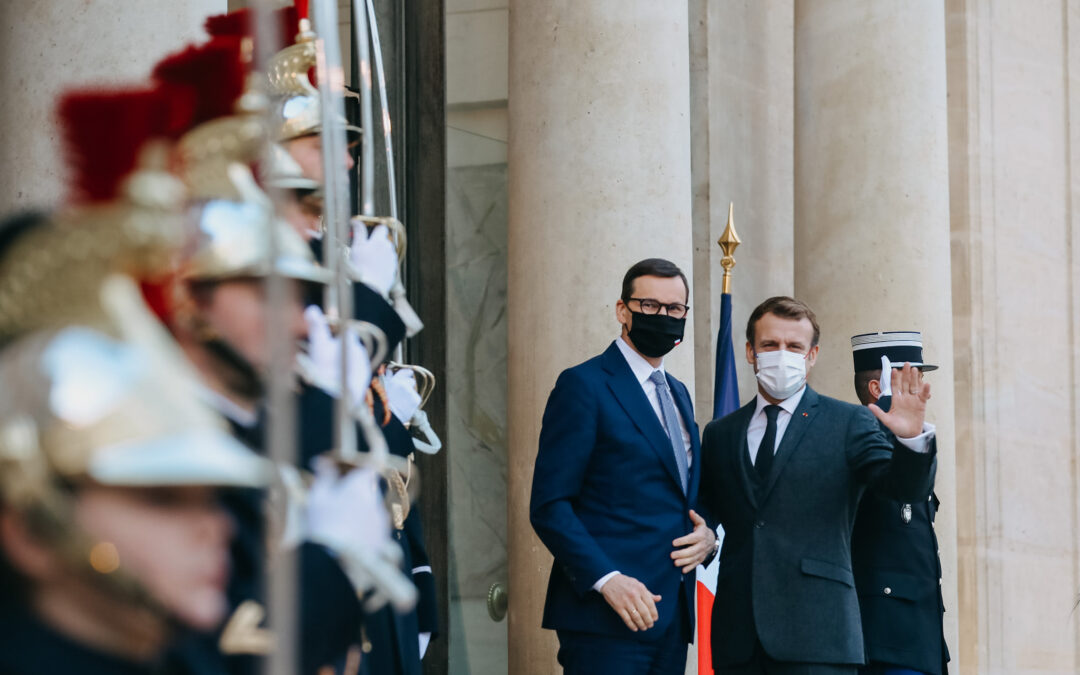Poland’s Prime Minister Mateusz Morawiecki is visiting the leaders of France, Slovenia, Germany and the UK in the next three days, to discuss the threats faced by a “united Europe”.
The visits follow a trip to the Baltic states at the weekend to discuss solidarity measures to deal with the migrant crisis that has escalated on the countries’ borders with Belarus. Morawiecki also met with his Croatian counterpart on Tuesday.
Poland has urged European leaders to keep up the pressure on Belarusian leader Alexander Lukashenko, whom it has accused of launching a “hybrid attack” on the entire EU with support from Russia by encouraging people, mostly from the Middle East, to cross the border.
In a video released at the weekend, Morawiecki said that Poland has provided “ample evidence” that Belarus was bringing people to its borders. “Today the target is Poland, but tomorrow it will be Belgium, Germany, France or Spain,” he said.
“This is just the beginning; the dictators will not stop,” he said, and pledged to “do everything to stop the evil threatening Europe”.
After meeting with French President Emmanuel Macron on Wednesday morning in Paris, Morawiecki said he spoke about “our Polish fears, but also about our hopes and ideas” to solve crises facing “united Europe”.
The visit comes weeks before Paris takes over the rotating EU Council presidency. “On behalf of Poland, I presented a programme of coherent activities that could be continued,” he said, and thanked France for “words of solidarity and expressions of support”.
“I see a solidarity-based approach during the talks, which are a continuation of our diplomatic offensive, so to speak, from a few weeks ago,” he said following the meeting.
After the meeting in Paris, Morawiecki headed for Slovenia, where he is meeting the country’s prime minister, Janez Janša. On Thursday he also plans to meet outgoing German Chancellor Angela Merkel, followed by UK Prime Minister Boris Johnson on Friday.
Poland has recently criticised western leaders for cutting the country out of discussions concerning the crisis, after Angela Merkel held two telephone calls with Lukashenko. She was the first EU head to talk directly with the Belarusian autocrat since his crackdown on protests last year.
Morawiecki also spoke to the German chancellor last week. He said that he stressed that “no arrangements that might concern Poland and the whole situation could be agreed without our participation” and that Merkel “accepted”, reported RMF FM.
Poland’s president, Andrzej Duda, also told his German counterpart Frank-Walter Steinmeier that the country would “not accept any decisions made over its head”. He told the press that “if any decisions are to be binding for Poland…then these will be decisions we alone will make”.
As the sense of urgency around Poland’s border crisis seemed to wane last week as the number of migrants coming to Minsk began to drop under EU diplomatic pressure, Morawiecki has set off on a tour of European capitals to warn of imminent dangers.
The Baltic countries he visited at the weekend have also seen surges of migrants seeking to illegally cross their borders in recent months. The leaders warned that the situation was not yet resolved, and highlighted the growing risks of further crises of military build-up and energy concerns to compound the migrant situation.
On Monday, Morawiecki also met the secretary-general of the Organisation for Economic Co-operation and Development (OECD), Mathias Cormann. The following day he met with his Croatian counterpart Andrej Plenković in Zagreb.
Morawiecki said that to counteract threats, including those to energy security raised by Russia and its state gas giant Gazprom, the country was investing in the Three Seas dimension.
He said that “north-south infrastructure – including gas, energy and road infrastructure” would “create new perspectives”, adding that he supported efforts by Croatia, Romania and Bulgaria to join the Schengen area to “take full advantage” of the initiative.
Poland’s border guard today said there had been 267 attempts to cross illegally into the country from Belarus on Tuesday. They reported further “aggressive” attempts, including by a group of 100 migrants who reportedly threw stones at Poles under the supervision of Belarusians.
Wczoraj tj.23.11 ok.19.00 grupa ponad 100 agresywnych cudzoziemców siłowo forsowała granicę🇵🇱🇧🇾. W służby polskie rzucano kamieniami.
Atak odbywał się pod nadzorem białoruskich służb.#zgranicy pic.twitter.com/vGwLO5MVvb— Straż Graniczna (@Straz_Graniczna) November 24, 2021
Main image credit: Mateusz Morawiecki/Facebook

Maria Wilczek is deputy editor of Notes from Poland. She is a regular writer for The Times, The Economist and Al Jazeera English, and has also featured in Foreign Policy, Politico Europe, The Spectator and Gazeta Wyborcza.




















